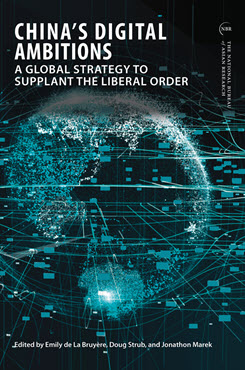Securing the Foundation
Building the Physical Infrastructure of the Digital World
This chapter finds that China’s expansion of its digital infrastructure internationally, though widely discussed, remains a vastly misunderstood and oversimplified problem.
Download the full report in: French | Japanese | Korean.
Download the Executive Brief in: French | Japanese | Korean.
The project also features an interactive data tool for visualizing the global reach of China’s digital ambitions and the relationships between different forms of Chinese digital influence: Access the data tool here.
EXECUTIVE SUMMARY
MAIN ARGUMENT
China’s global export of digital infrastructure provides a foundation for the party-state to gain greater access to, and control over, data internationally, while also affording new avenues for Chinese digital companies to gain greater market access that can be leveraged to advance the government’s strategic interests. Most debate on the issue underestimates the risks associated with the ways control over digital infrastructure can enable future efforts by the party-state that undermine the interests of countries whose data is being accessed and used. For example, control over digital infrastructure can allow for collection of data that, when aggregated, creates greater visibility of a society, enabling other efforts to subvert democratic debate. It can also embed standards that go against liberal democratic values by enforcing authoritarian definitions of risk rather than democratic definitions. Ultimately, however, the largest issue is that China has a political system that is fundamentally different from liberal democracies and that is embedded in the digital technologies and infrastructure researched and developed in China and exported globally.
POLICY IMPLICATIONS
- Data security policy in liberal democracies is not yet effective enough to account for the risks that China creates through its approach to data security.
- Liberal democracies must develop a better approach for identifying strategic datasets and conducting due diligence on digital supply chain security risks.
- Liberal democratic governments must develop responses to China’s use of technology to expand its power globally with the understanding that technology develops on a trajectory and capabilities are likely to improve over time rather than be static.
- Liberal democracies must adopt a more multidisciplinary approach to due diligence on decisions related to digital infrastructure. This approach cannot be country-agnostic and must account for country-specific policy drivers. It must also take into account digital supply chain risks associated with data collection and use.
- Liberal democracies must develop responses that better account for uncertainties around a technology’s trajectory or a country’s ability to translate concepts into capabilities.
Samantha Hoffman is a Senior Analyst at the Australian Strategic Policy Institute.



 Identifying and Countering China’s Global Digital Strategy (Paris)
Identifying and Countering China’s Global Digital Strategy (Paris)

